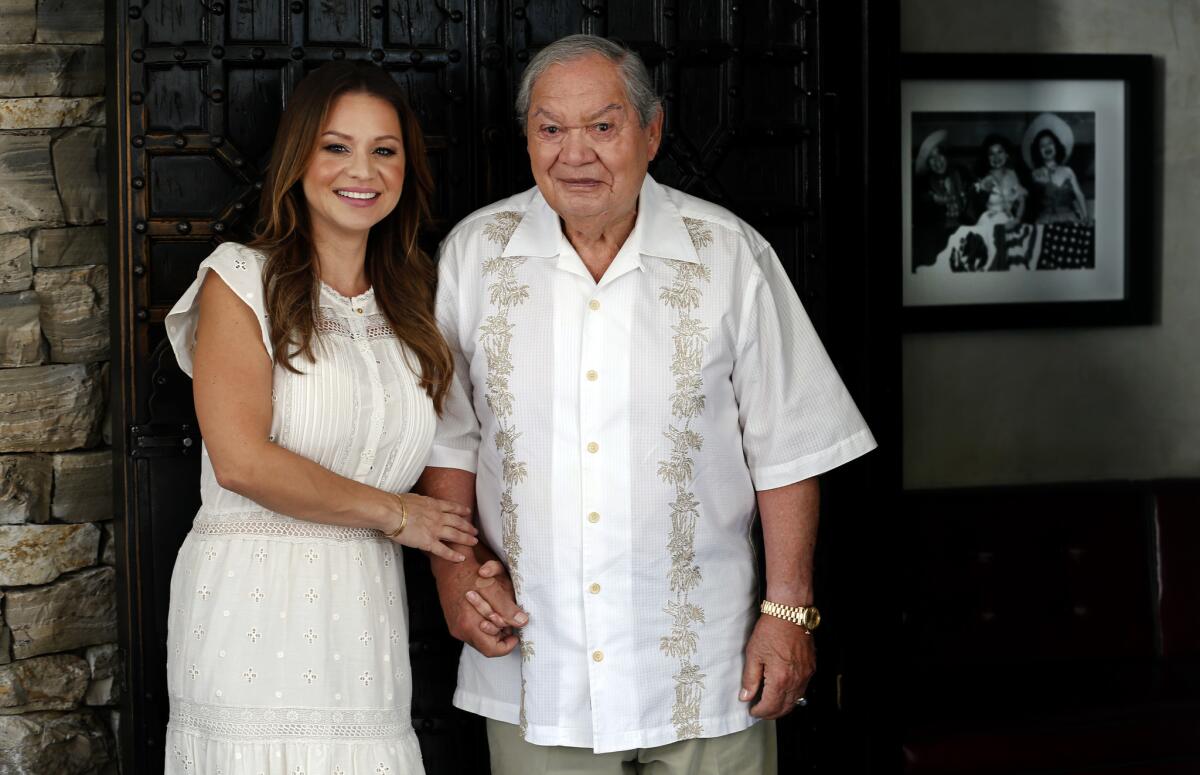Rafael ‘Ray’ Vega, who owned celebrity favorite Casa Vega Mexican restaurant, dies

- Share via
For decades, Rafael “Ray” Vega made the rounds in the brick-lined dining room of Casa Vega restaurant in Sherman Oaks, dressed sharply in a sweater vest with a name tag fastened to the front.
“Hi, I’m Ray Vega and this is Casa Vega,” he would say. He often hosted Marlon Brando, Cary Grant, George Clooney, Al Pacino and other actors and studio executives, who sipped margaritas, tucked into the restaurant’s signature tufted red leather booths.
Vega, who helped introduce and popularize Mexican food in the San Fernando Valley, died from complications of COVID-19 on Saturday at age 86, according to his daughter, Christina “Christy” Vega. He had been battling dementia and Parkinson’s disease for the past 15 years.
Vega came from a family determined to be in the restaurant business. Born in National City, Calif., on Aug. 27, 1934, Vega’s grandmother and pregnant mother drove from their home in Tijuana to a hospital in the U.S. to have the baby.
Shortly after he was born, Vega’s parents, Maria and Rafael, left Vega in Tijuana with his grandmother and immigrated to Los Angeles, where they opened Cafe Caliente restaurant on Olvera Street. When Vega was 2 they moved him to the family home in Burbank, along with his older sister Frances, who acted as his nanny.
Vega grew up at the restaurant, spending much of his childhood on Olvera Street. He attended a Catholic military school in Orange County and John Burroughs High School in Burbank, where he was on the football team. He moved to the Bay Area to study hospitality at San Francisco State University but after a year moved back to Los Angeles to help his family.
After a successful 18-year run, Rafael and Maria closed Cafe Caliente and opened another Mexican restaurant in Hollywood.
“Mexicans were not that welcome outside of downtown and the business went under in four years,” Christy said.
At 22, Vega got a job selling life insurance to help support the family, but he never gave up on his parents’ dream of running restaurants. He found someone to loan him the money for a few months’ rent at a restaurant space on Ventura Boulevard, two blocks from where Casa Vega now stands.
He opened Casa Vega in 1956 and put both his parents to work. Rafael was the lead bartender, while Maria helped teach the cooks to make her recipes for cheese enchiladas and mole poblano. Frances came to work as a hostess.
The restaurant quickly outgrew its original location, and Vega moved to a larger space at the corner of Ventura Boulevard and Fulton Avenue. He credited a fateful visit from Jane Fonda and Gig Young as the catalyst that turned the restaurant into one of Hollywood royalty’s favorite haunts. Soon, Cary Grant and Dyan Cannon came in, followed by a slew of other celebrities. One of Vega’s favorite stories to tell was about the night Christy was born.
“My dad went back to the restaurant to share the good news with everyone and Marlon Brando was there,” she said. ‘They drank a bottle of 1800 Tequila together.”
In the 1970s and ’80s, Vega spent most nights in the Casa Vega dining room, clearing tables, bringing people more chips and talking to customers. He met his wife, Charleen, in the restaurant’s bar in 1976.
“His favorite thing to do was be there at night when it was full,” Christy said. “My dad respected the local Valley neighbor just as much as any celebrity.”
Vega was civic-minded as well. In the late ’60s, he got involved with local politics, serving as the commissioner of the Los Angeles Department of Public Social Services for two years, followed by a seven-year stint as chairman of the L.A. County Housing Authority. Soon, he secured government contracts to run the dining halls at a handful of government bases in California.
In 1978 he was given the opportunity to run the dining hall at Nellis Air Force Base in Nevada. He left Frances in charge of Casa Vega and moved the family to Las Vegas.
Thus began the start of a decades-long career in the distribution business in Nevada under the name Vega Enterprise. The corporate umbrella included a vending company, a distribution company and a wholesale company that supplied vending machines and products to U.S. Air Force bases, casinos and 7-Elevens.
In the ’80s, he started Vega Bar and Concessions, which sold liquor and bar supplies. Between the late ’70s and the ’90s, Christy said, Vega Enterprise was grossing more than $60 million a year. Vega received many awards during this time, but his most meaningful was his appointment as honorary consul general for Mexico to the state of Nevada in 1996.
But the restaurant business was always calling. In 2000, Vega started to sell off Vega Enterprise piece by piece and moved back to Los Angeles. He returned to Casa Vega, where daughter Christy was already helping to run the business. She took over as president in 2012 but said her dad visited the restaurant every day.
“We would have lunch and catch up, and it made him feel good and soothed him,” Christy said. By that time, her father had been diagnosed with dementia and Parkinson’s disease.
“Even on his deathbed, he wanted to hear about Casa Vega,” she said.
In addition to his wife and daughter Christy, Vega is survived by daughter Kelly Schettler; son Robbie; granddaughters Emilee, Lizzy and Mia; and grandsons Jackson, Rafael Palmer, Ryan Jr. and Cruz.
More to Read
Eat your way across L.A.
Get our weekly Tasting Notes newsletter for reviews, news and more.
You may occasionally receive promotional content from the Los Angeles Times.











